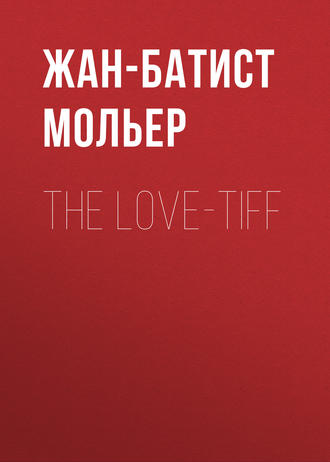
Мольер (Жан-Батист Поклен)
The Love-Tiff
SCENE II. – VALÈRE, ASCANIO, FROSINE
VAL. If you are conversing, and if my presence is any interruption, I shall withdraw.
ASC. No; you may well interrupt it, since we were talking about you.
VAL. About me?
ASC. About yourself.
VAL. How so?
ASC. I was saying, that if I had been a woman, Valère would have been able to please me but too well, and that if I had been beloved by him, I should not have delayed long to make him happy.
VAL. This declaration does not cost you much, as there is such an if in the way; but you would be finely caught if some miraculous event should put to the proof the truth of so obliging a declaration.
ASC. Not in the least; I tell you that if I reigned in your heart, I would very willingly crown your passion.
VAL. And what, if you might contribute to my happiness, by assisting me to further my love?
ASC. I should then, certainly, disappoint you.
VAL. This admission is not very polite.
ASC. What, Valère? Supposing I were a woman and loved you tenderly, would you be so cruel as to make me promise to aid you in your love for another lady? I could not perform such a painful task.
VAL. But you are not a woman.
ASC. What I said to you I said in the character of a woman, and you ought to take it so.
VAL. Thus I ought not to imagine you like me, Ascanio, unless Heaven works a miracle in you. Therefore, as you are not a woman, I bid farewell to your affection; you do not care in the least for me.
ASC. My feelings are far more nice than people imagine, and the smallest misgiving shocks me when love is in the case. But I am sincere; I will not promise to aid you, Valère, unless you assure me that you entertain precisely the same sentiments for me; that you feel the same warmth of friendship for me as I feel for you; and that if I were a woman you would love no one better than me.
VAL. I never before heard of such a jealous scruple, but though quite unexpected, this affection obliges me to make some return for it; I here promise you all you require of me.
ASC. But sincerely?
VAL. Yes, sincerely.
ASC. If this be true, I promise you that henceforth your interests shall be mine.
VAL. I have a secret of the utmost consequence to reveal to you by and by, and then I shall remind you of your words.
ASC. And I have likewise a secret to discover to you, wherein your affection for me may show itself.
VAL. Indeed! what can that be?
ASC. I have a love affair which I dare not reveal, and you have influence enough over the object of my passion to promote my happiness.
VAL. Explain yourself, Ascanio, and be assured beforehand that, if your happiness lies in my power, it is certain.
ASC. You promise more than you imagine.
VAL. No, no; tell me the name of the person whom I have to influence.
ASC. It is not yet time, but it is a person who is nearly related to you.
VAL. Your words amaze me; would to Heaven my sister…
ASC. This is not the proper time to explain myself, I tell you.
VAL. Why so?
ASC. For a certain reason. You shall know my secret when I know yours.
VAL. I must have another person's permission before I can discover it to you.
ASC. Obtain it then; and when we shall have explained ourselves we shall see which of us two will best keep his word.
VAL. Farewell, I accept your offer.
ASC. And I will be bound by it, Valère. (Exit Valère.)
FROS. He thinks you will help him as a brother.
SCENE III. – LUCILE, ASCANIO, MARINETTE, FROSINE
LUC. (Saying the first words to Marinette). I have done it; it is thus I can revenge myself; if this step torments him, it will be a great consolation to me… Brother, you perceive a change in me; I am resolved to love Valère, after so much ill-usage; he shall become the object of my affection.
ASC. What do you say, sister? How do you change so suddenly? This inconstancy seems to me very strange.
LUC. Your change of disposition has more cause to surprise me. You formerly used always to plead in favour of Valère; for his sake you have accused me of caprice, blind cruelty, pride and injustice; and now, when I wish to love him, my intention displeases you, and I find you speaking against his interest.
ASC. I abandon his interest, sister, out of regard to yours. I know he is under the sway of another fair one; it will be a discredit to your charms if you call him back, and he does not come.
LUC. If that is all, I shall take care not to suffer a defeat; I know what I am to believe of his passion; he has shown it very clearly, at least so I think; you may safely discover my sentiments to him: or if you refuse to do it, I, myself shall let him know that his passion has touched me. What! you stand thunderstruck, brother, at those words!
ASC. Oh, sister, if I have any influence over you, if you will listen to a brother's entreaties, abandon such a design; do not take away Valère from the love of a young creature, in whom I feel great interest, and for whom, upon my word, you ought to feel some sympathy. The poor unfortunate woman loves him to distraction; to me alone she has disclosed her passion; I perceive in her heart such a tender affection, that it might soften even the most relentless being. Yes, you yourself will pity her condition when she shall become aware with what stroke you threaten to crush her love; so sure am I of the excess of her grief, that I am certain, sister, she will die, if you rob her of the man she adores. Éraste is a match that ought to satisfy you, and the mutual affection you have for one another…
LUC. Brother, it is sufficient! I do not know in whom you take such an interest; but let us not continue this conversation, I beg of you; leave me a little to my own thoughts.
ASC. Cruel sister, you will drive me to despair if you carry your design into execution.
SCENE IV. – LUCILE, MARINETTE
MAR. Your resolution, madam, is very sudden.
LUC. A heart considers nothing when it is once affronted, but flies to its revenge, and eagerly lays hold of whatever it thinks can minister to its resentment. The wretch! To treat me with such extreme insolence!
MAR. You see I have not yet recovered the effects; though I were to brood over it to all eternity, I cannot understand it, and all my labour is in vain. For never did a lover express more delight on receiving good news; so pleased was he with your kind note that he called me nothing less than a divine creature; and yet, when I brought him the other message, there was never a poor girl treated so scurvily. I cannot imagine what could happen in so short a time to occasion so great a change.
LUC. Do not trouble yourself about what may have happened, since nothing shall secure him against my hatred. What! do you think there is any secret reason for this affront but his own baseness? Does the unfortunate letter I sent him, and for which I now blame myself, present the smallest excuse for his madness?
MAR. Indeed, I must say you are right; this quarrel is downright treachery; we have both been duped, and yet, madam, we listen to these faithless rascals who promise everything; who, in order to hook us, feign so much tenderness; we let our severity melt before their fine speeches, and yield to their wishes, because we are too weak! A shame on our folly, and a plague take the men!
LUC. Well, well! let him boast and laugh at us; he shall not long have cause to triumph; I will let him see that in a well-balanced mind hatred follows close on slighted favours.
MAR. At least, in such a case, it is a great happiness to know that we are not in their power. Notwithstanding all that was said, Marinette was right the other night to interfere when some people were in a very merry mood. Another, in hopes of matrimony, would have listened to the temptation, but nescio vos, quoth I.
[Footnote: These two Latin words, which were in very common use in France, during Molière's time, are taken from the Vulgate, Matthew xxv. 12: "Domine, domine, aperi nobis." – At ille respondens ait: "Amen dico vobis, nescio vos."]
LUC. How foolishly you talk; how ill you choose your time to joke! My heart is full of grief. If ever fate wills it that this false lover, – but I am in the wrong to conceive at present any such expectation; for Heaven has been too well pleased to afflict me to put it in my power to be revenged on him, – but if ever a propitious fate, I say, should cause Éraste to come back to me, and lay down his life as a sacrifice at my feet, as well as declare his sorrow for what he has done to-day, I forbid you, above all things, to speak to me in his favour. On the contrary, I would have you show your zeal by setting fully before me the greatness of his crime; if my heart should be tempted ever to degrade itself so far, let your affection then show itself; spare me not, but support my anger as is fit.
MAR. Oh! do not fear! leave that to me; I am at least as angry as you; I would rather remain a maid all my life than that my fat rascal should give me any inclination for him again. If he comes…
SCENE V. – MARINETTE, LUCILE, ALBERT
ALB. Go in, Lucile, and tell the tutor to come to me; I wish to have a little talk with him; and as he is the master of Ascanio, find out what is the cause that the latter has been of late so gloomy.
SCENE VI. – ALBERT, alone
Into what an abyss of cares and perplexities does one unjust action precipitate us. For a long time I have suffered a great deal because I was too avaricious, and passed off a stranger for my dead son. When I consider the mischief which followed I sincerely wish I had never thought of it. Sometimes I dread to behold my family in poverty and covered with shame, when the deception will be found out; at other times I fear a hundred accidents that may happen to this son whom it concerns me so much to preserve. If any business calls me abroad, I am afraid of hearing, on my return, some such melancholy tidings as these: "You know, I suppose? Have they not told you? Your son has a fever; or he has broken his leg or his arm." In short, every moment, no matter what I do, all kinds of apprehensions are continually entering into my head. Ha!
SCENE VII. – ALBERT, METAPHRASTUS
MET. Mandatum tuum euro diligenter.
[Footnote: "I hasten to obey your order."]
ALB. Master, I want to…
MET. Master is derived from magis ter; it is as though you say "thrice greater."
ALB. May I die if I knew that; but, never mind, be it so. Master, then…
MET. Proceed.
ALB. So I would, but do not proceed to interrupt me thus. Once more, then, master, for the third time, my son causes me some uneasiness. You know that I love him, and that I always brought him up carefully.
MET. It is true: filio non potest praeferri nisi filius.
[Footnote: "To a son one can only prefer a son." An allusion to an article of feudal law.]
ALB. Master, I do not think this jargon at all necessary in common conversation. I believe you are a great Latin scholar and an eminent doctor, for I rely on those who have told me so; but in a conversation which I should like to have with you, do not display all your learning – do not play the pedant, and utter ever so many words, as if you were holding forth in a pulpit. My father, though he was a very clever man, never taught me anything but my prayers; and though I have said them daily for fifty years, they are still High-Dutch to me. Therefore, do not employ your prodigious knowledge, but adapt your language to my weak understanding.
MET. Be it so.
ALB. My son seems to be afraid of matrimony; whenever I propose a match to him, he seems indifferent, and draws back.
MET. Perhaps he is of the temper of Mark Tully's brother, whom he writes about to Atticus. This is what the Greeks call athanaton…
[Footnote: Immortal.]
ALB. For Heaven's sake! you ceaseless teacher, I pray you have done with the Greeks, the Albanians, the Sclavonians, and all the other nations you have mentioned; they have nothing to do with my son.
MET. Well then, your son…?
ALB. I do not know whether a secret love does not burn within him. Something disturbs him, or I am much deceived; for I saw him yesterday, when he did not see me, in a corner of the wood, where no person ever goes.
MET. In a recess of a grove, you mean, a remote spot, in Latin secessus. Virgil says, est in secessu locus…
[Footnote: "There is a remote spot"]
ALB. How could Virgil say that, since I am certain that there was not a soul in that quiet spot except us two?
MET. I quote Virgil as a famous author, who employed a more correct expression than the word you used, and not as a witness of what you saw yesterday.
ALB. I tell you I do not need a more correct expression, an author, or a witness, and that my own testimony is sufficient.
MET. However, you ought to choose words which are used by the best authors: tu vivendo bonos, scribendo sequare peritos, as the saying is.
[Footnote: "Regulate your conduct after the example of good people, your style after good authors."]
ALB. Man or devil, will you hear me without disputing?
MET. That is Quintilian's rule.
ALB. Hang the chatterbox!
MET. He has a very learned sentence upon a similar subject, which, I am sure, you will be very glad to hear.
ALB. I will be the devil to carry you off, you wretch. Oh! I am very much tempted to apply something to those chops.
MET. Sir, what is the reason that you fly in such a passion! What do you wish me to do?
ALB. I have told you twenty times; I wish you to listen to me when I speak.
MET. Oh! undoubtedly, you shall be satisfied if that is all. I am silent.
ALB. You act wisely.
MET. I am ready to hear what you have to say.
ALB. So much the better.
MET. May I be struck dead if I say another word!
ALB. Heaven grant you that favour.
MET. You shall not accuse me henceforth of talkativeness.
ALB. Be it so.
MET. Speak whenever you please.
ALB. I am going to do so.
MET. And do not be afraid of my interrupting you.
ALB. That is enough.
MET. My word is my bond.
ALB. I believe so.
MET. I have promised to say nothing.
ALB. That is sufficient.
MET. From this moment I am dumb.
ALB. Very well.
MET. Speak; go on; I will give you a hearing at least; you shall not complain that I cannot keep silent; I will not so much as open my mouth.
ALB. (Aside). The wretch!
MET. But pray, do not be prolix. I have listened already a long time, and it is reasonable that I should speak in my turn.
ALB. Detestable torturer!
MET. Hey! good lack! would you have me listen to you for ever? Let us share the talk, at least, or I shall be gone.
ALB. My patience is really…
MET. What, will you proceed? You have not done yet? By Jove, I am stunned.
ALB. I have not spoken…
MET. Again! good Heavens! what exuberant speechifying! Can nothing be done to stop it?
ALB. I am mad with rage.
MET. You are talking again! What a peculiar way of tormenting people! Let me say a few words, I entreat you; a fool who says nothing cannot be distinguished from a wise man who holds his tongue.
ALB. Zounds! I will make you hold yours. (Exit).







